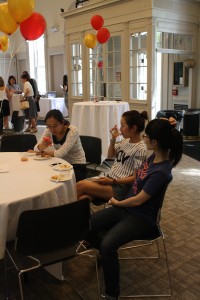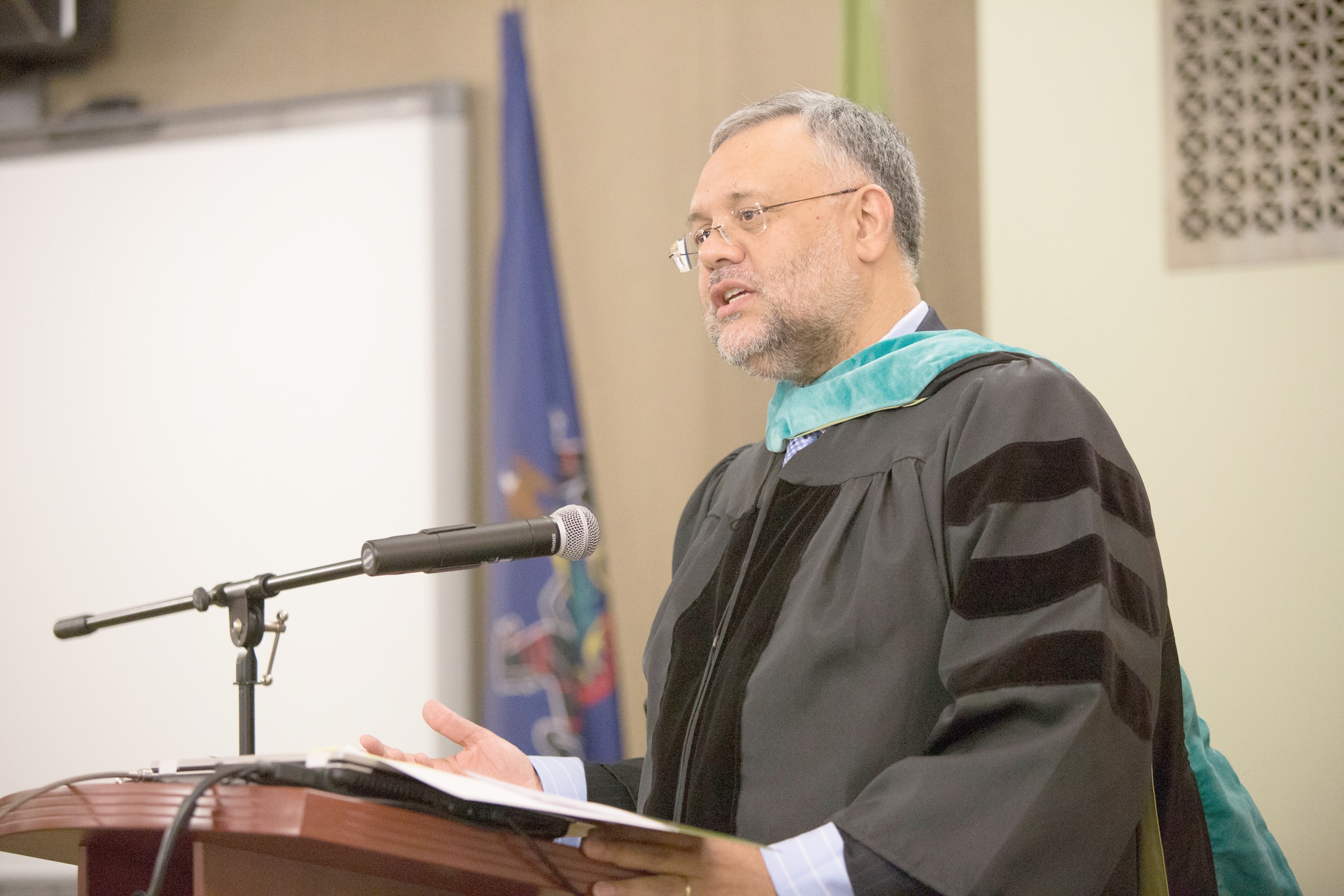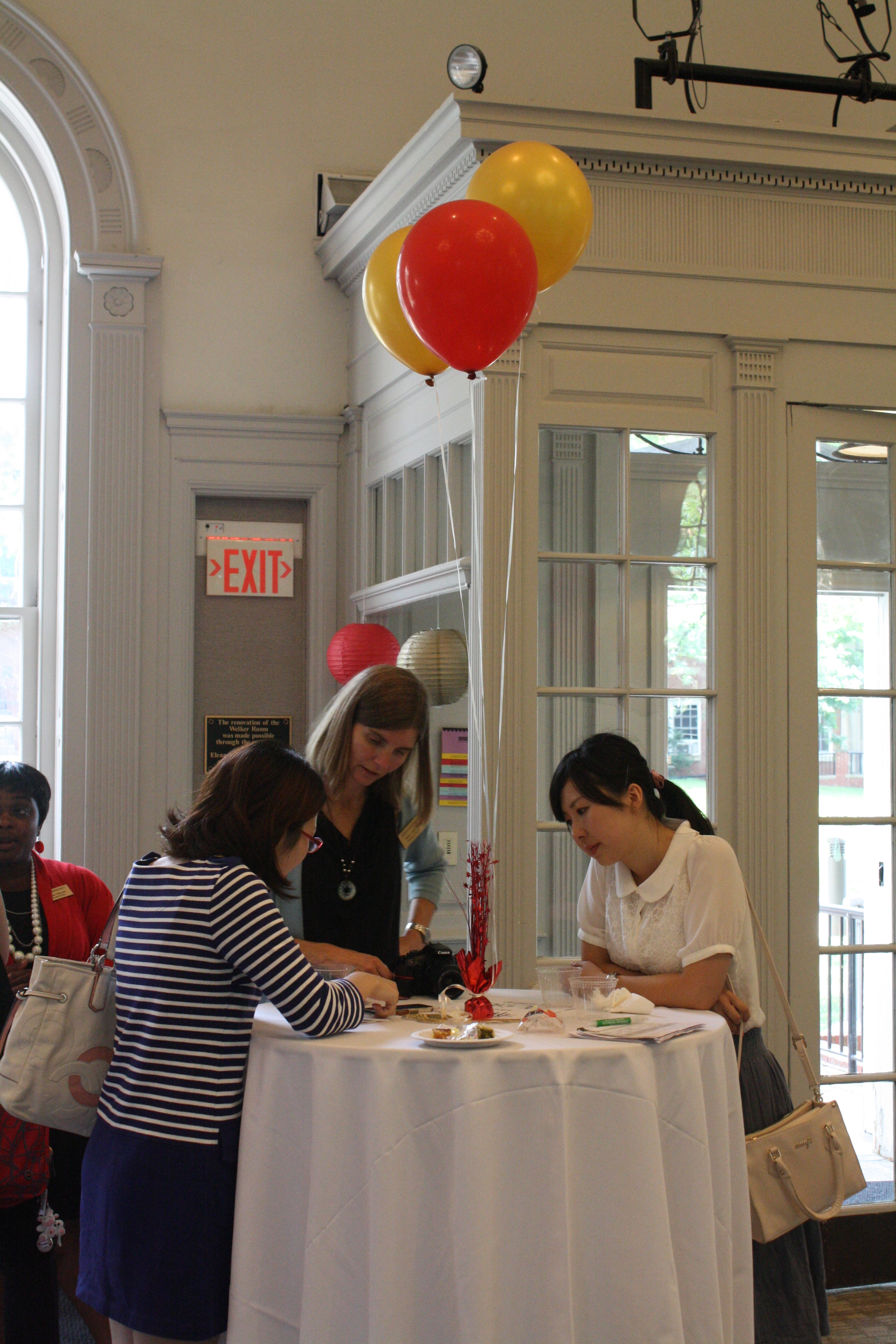On Tuesday, September 9, students from all around the world gathered in Welker Room in the Laughlin Music Hall to meet new people, enjoy food, and listen to music at the Global Mixer in observance of the Chinese Mid-Autumn Festival.
The Mid-Autumn Festival, which fell on Monday, September 8 this year, is China’s harvest festival that celebrates the full moon closest to the autumnal equinox. The full moon is believed to bring peace, prosperity, and family harmony.
Welker was decorated for the festivities with red and gold balloons–colors that are usually associated with good fortune and happiness in Chinese culture. Each table was decorated with a sheet of paper which bore words like “happiness,” “harmony,” “music,” and “peace,” and the words’ translation into Chinese characters.
Also available was a photo booth, consisting of a red paper backdrop decorated with gold paper lanterns. Party masks were supplied for students to don while getting their picture taken.
Though the Mixer honored Chinese culture, it differed from a traditional Mid-Autumn festival celebration in China.
“[To celebrate], family members gather together,” said Qian Li, a Chinese student in the Masters of Science in Nursing program. “At night, if the weather is okay, we go outside to appreciate the moon,” she said.
Food is also an essential part of the Mid-Autumn Festival.
“We eat the moon cake. It’s the most important part,” said Zhing Zhai, a Chinese student in the Masters of Interior Architecture program. “Even if people don’t eat moon cakes, they buy them to send to friends.”

Photo Credit: Ivy Kuhrman
According to Zhai, although there was only one type of sweet moon cake at the Global Mixer, there are more varieties to choose from in China, including those filled with chicken or with ice cream.
Although the artichoke dip and peach cobbler were plentiful, the Mixer’s buffet ran out of moon cakes early on, which left some students disappointed.
“I really wanted to have some moon cakes, but there weren’t many, so I didn’t get any,” first-year student Bethany Bookout said.
Though the Chinese festival was the focus of the Mixer, guests were not limited to Chinese students. According to International Student Services Coordinator Vivian Yamoah, invitations were extended to international students on campus, to all the members of the Laughlin Intercultural Living Learning Community, and to the rest of the Chatham Community. Guests hailed from many countries, including Bangladesh, Costa Rica, Japan, Palestine, South Korea, and Zambia. Approximately 80 people joined in, with 68 official student sign-ins.
The Office of International Affairs hosted the event in hopes of enriching students’ global awareness.
“Our idea is to welcome the new international students and make them feel at home,” said Study Abroad Coordinator and Acting Director of International Affairs Karin Chipman. “We want them to mix together and get to know other perspectives outside of just those in Pittsburgh.”
Many students chose to attend the event in hopes of achieving Chipman’s goal.
“I wanted to try out delicacies from different parts of the world and talk to other international students,” said Komal Kooduvalli, who has come from Bangalore, India to obtain a Masters in Sustainability.
“It’s interesting to get to know other people,” said Jenny Wittann, from Berlin, Germany, who is also in the Masters in Sustainability program. “I don’t know much about the Chinese culture, and I hope to learn more about it.”
“My favorite part is the food,” said American graduate student Dayna Van Fleet. “The company is pretty good, too,” she said, chuckling, when reminded by her tablemates Kooduvalli and Wittann.
To encourage further intercultural communication, the Office of International Affairs will hold smaller Global Mixers on the third Thursdays of October and November in Café Rachel from 3:30 p.m. to 5:00 p.m.



